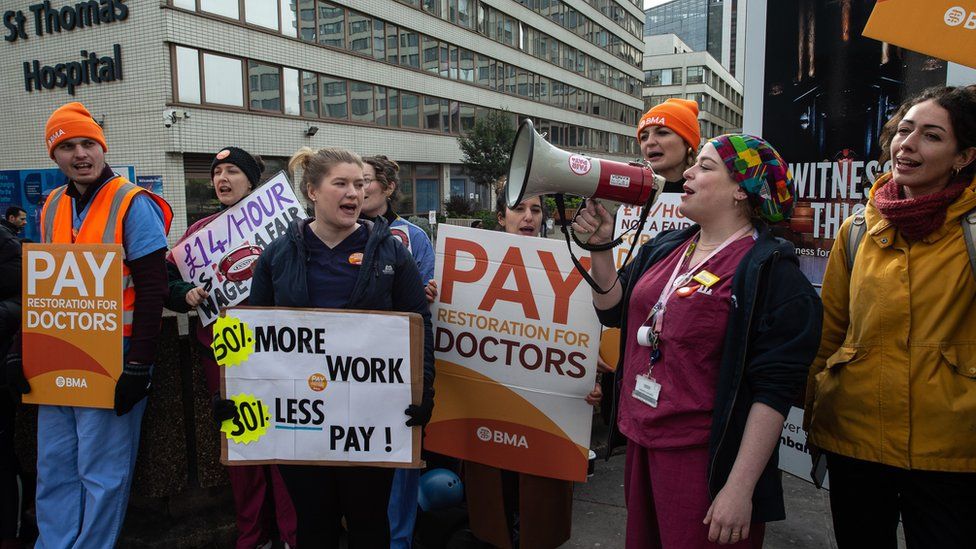ARTICLE AD BOX
 Image source, Getty Images
Image source, Getty Images
Up to quarter of a million operations and appointments could be postponed due to next week's junior doctors' strike, the NHS Confederation warns.
Patients are likely to see more of an impact because the four-day walkout comes after the Easter weekend, said Dr Layla McCay, director of policy at the health bosses' confederation.
Health bosses "are more concerned about this than they have been about any other strike", she said.
The walkout is due to start on Tuesday.
Hospital bosses have said they cannot guarantee patients will be safe as managers struggle to arrange staffing during the strike, which will affect both emergency and planned care.
The British Medical Association (BMA) says it will not exempt any services but that there are plans to protect patients, which could involve pulling junior doctors off the picket line if individual hospitals report lives are in immediate danger.
It is calling for a 35% pay rise to make up for 15 years of below-inflation wage rises.
Dr McCay told BBC Radio 4's Today programme: "In the last junior doctors' strike, we saw about 175,000 appointments and operations having to be postponed.
"In terms of the disruption that we're anticipating this time, we reckon it could be up to about a quarter of a million so that is a huge amount of impact for patients up and down the country.
"It's also a massive administrative challenge."
The walkout will be from 07:00 BST on Tuesday to 07:00 BST on Saturday. During last month's strike, hospitals drafted in consultants to provide cover but it is estimated a quarter of them are on leave due to the Easter holidays.
"With the junior doctors out for the four days, but those four days being bookmarked either side by the Easter weekend and another weekend, the disruption is going to go on for 10 or 11 days," said Dr McCay.
"What we expect to see is really significant diminished capacity within the health service."
On health leaders' fears about the strikes, she added: "They think the impact is going to be so significant that this one is likely to have impact on patient safety, and that is a huge concern for every healthcare leader."
Postponements are likely so that hospitals can focus on the most urgent and life-threatening cases, said Dr McCay.
Health Secretary Steve Barclay has been urged to meet union representatives over the bank holiday weekend to try to resolve the issue.
Dr Vivek Trivedi, co-director of the junior doctors' committee at the BMA, said they want to be sure Mr Barclay "is serious about pay erosion" - but added he is yet to put a credible offer on the table.
"All we're asking for is a credible offer that shows us he's serious, that we can start a path of negotiations to try to address the real-terms pay cut," he said.
The Department of Health and Social Care has said the BMA has to call off the strike for any negotiations to take place.
It says the government is working with NHS England to put contingency plans in place to protect patient safety during the strike.
"The NHS will prioritise resources to protect emergency treatment, critical care, maternity and neonatal care, and trauma," a spokesman said.

 2 years ago
53
2 years ago
53








 English (US) ·
English (US) ·